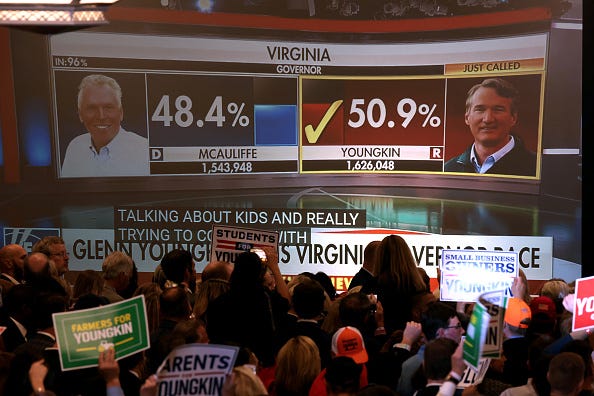
Tuesday’s election night earthquake has sent an already skittish Democratic party into tailspins of anxiety about the 2022 midterms. Virginia was a “solid blue” state. Who better than to retain the governorship there than a Clinton-era former governor? Well, old habits die hard.
Here’s a few perspectives on what this means for 2022 … and beyond.
1) Democrats have to clear a higher bar.
The bar was already lower for Republicans. After all, the central Republican message has been “less government.” You can forgive the public for reading “less” as worse. And worse government only serves the argument for less government. So Republicans have little incentive to run the government well. Four years of Donald Trump, replete with breathtaking incompetence masked by all-out culture war, has only served to lower the bar for Republicans even further.
All of this means that Democrats aren’t just expected to be the adults in the room, they’re expected to massively outperform their counterparts. And let’s face it, it’s been a tough nine months for the Biden administration. The delta variant threw a massive wrench into the administration's recovery efforts, leaving a precarious economy at the precipice. Meanwhile, problems at the border, rows with allies, the Afghanistan debacle and a stalled legislative package haven’t helped.
With all that in tow, Glenn Youngkin’s job wasn’t that hard: Be the alternative, but don’t be Trump.
2) It’s the pandemic, stupid.
As I wrote last week in The New Republic, it’s impossible to understand any of the oddities of this moment outside the context of the pandemic. When we talk about the pandemic, it’s not just the virus floating around, infecting people. It’s the supply chain. It's inflation. It’s the debate over education. Trying to understand this political moment outside the pandemic is a fool’s errand.
3) “Do. Or do not. There is no try.”
Yoda’s famous aphorism might as well apply to politics. There’s been a debate roiling about “popularism,” or whether or not Democrats should just talk about “popular” things and not talk about issues that call up schisms in society, like racism and immigration. I wrote about this from the vantage point of Michigan’s Yemeni community.
It turns out, it probably doesn’t matter as much what Democrats talk about — it matters what they do about it. And for the past several months, Americans have been watching as Democrats have done little talking about the actual issues that matter to voters, and have done even less.
Paid family leave, universal childcare and pre-K, two years of free post-high school education, allowing Medicare to negotiate prescription drug costs — all of these are broadly popular. But, as I’ve written, rather than talking about these and more, Democrats have allowed the conversation to focus more on the price of the reconciliation package than what it would accomplish. Then they hit brick walls in their own party. No, it’s not progressives who’ve rightly held up the bipartisan infrastructure deal until both that and the “Build Back Better” package can clear together — it's the two Senators who won’t get firm on the latter as they pick off program after program like petals on a flower.
4) Democrats aren’t learning the right lessons.
But I fear Democrats won’t learn that lesson. Rather, moderates will reflexively back away from the package altogether. They’ll take the Virginia rebuke not as a comment on their failure to pass broadly popular legislation, but as a repudiation of that legislation itself.
They’re already blaming the progressive wing of the party for daring to try to spur them to action, rather than blaming the election on the loss of one of their own who struggled to find a message that could beat a political novice in a blue-leaning state.
But here’s the problem, backing away from Build Back Better now will only doom Democrats to a bigger disaster in the midterms. Democrats can and must have something to show for themselves for the power they’ve held in Washington.
5) The twilight of Donald Trump.
In better news, the biggest loser on Tuesday night wasn’t Terry McAuliffe or Joe Biden but Donald Trump. Glenn Youngkin did everything he could to distance himself from the likeness of Donald Trump in traditional media while courting Trump’s base through a steady diet of far right media outlets. Though he took no turns at Donald Trump’s blow horn (at least not to a broad audience), Glenn Younking still blew plenty of dog whistles intended specifically to stoke racial tensions among suburban white voters. The central actor of his closing ad was a white mother trying to protect her son from having to read Toni Morrison in school.
As much as Terry McAuliffe wished he was, Glenn Youngkin is not Donald Trump. He’s more Ronald Reagan. Donald Trump is an imminent existential threat to our democracy, and Youngkin’s victory should be read as an immediate repudiation of Trump within the GOP. That’s a good thing.
But even though Reaganism wasn’t a full frontal assault on democracy, it was a slow steady poison that destroyed basic public goods that millions since — particularly Black and brown people — have suffered without. Reagan weaponized race and racism through the same dog whistles that Youngkin’s campaign used so effectively.
Indeed, the historical parallel here is instructive. Reagan got his start in politics campaigning for a far more offensive, far less capable communicator: Barry Goldwater. Reagan figured out how to sand the rough parts off of Goldwater, how to offer Goldwater’s hard-nosed conservative extremism with a smile. Youngkin appears to have done the same to Trump.
While Trump remains a potent force in Republican politics, he’s no longer the only game in town.
6) The Younger-kins are coming.
Glenn Youngkin offers the GOP an alternative to the crass Trumpism that has dominated the GOP for the last five years. Youngkin has created a new playbook for the party. Trade rage and anger for a smile and a fleece vest. Rather than all-out culture war, wage coded guerrilla culture war. Racial resentment, corporate giveaways, guns, anti-abortion, anti-immigrant, anti-LGBTQ extremism are easier to sell when you seem like a suburban dad. Weaponize the debate over public schools to control them and replace them with private charters.
Granted, there are several features of Youngkin’s rise that make replicating him a challenge: he was nominated by convention, rather than having to come through a primary where he risked political capture by the Trump base. He’s also a true political outsider who emerged after the Trump presidency, untainted by years of Trump loyalty tests.
Nevertheless Democrats prepare for the midterms, they’ll need to retool. Virginia proved that Democrats aren’t campaigning against Trump anymore. To have a prayer of keeping the House, let alone the Senate, Democrats need to prepare for the Younger-kins. They could start by actually passing Joe Biden’s agenda.











One point that is hardly ever considered when costs are discussed is return on investment (ROI). Take, for example, affordable, high quality child care as a service everyone can access. We have short term returns with parents able to go to work or school without worry; and long term investment returns such as the emotional health of adults when they have a nurturing birth-five year experience and support for their parents. The economic ROI is only one way to measure success. There are so many other "quality of life" returns that are difficult to quantify with data, but can be seen anecdotally.
Good to read about the VA election in historical context. The Democratic candidate in the VA governor's race was Bill Clinton's self described, best buddy. Clinton did many things, some good, but over time he is remembered for these two: End Welfare as We Know It, and Nafta,(North American Free Trade Agreement). NAFTA took many millions of jobs to places where the labor is cheaper. Families continue to suffer severely from the actions of this previous Democratic administration.
The VA Democratic candidate McAullife and the Republican candidate, Youngkin were pretty much the same ; a corporate Democrat and a corporate Republican. This kind of contest raises the question, Why Vote? Perhaps that Outcome, was the reason for these candidates!
Interesting that American news media fails to inform about the great victories by progressive Democrats last night, and what that means for future elections: Mayors in Pittsburgh, Cincinnati, etc; along with many other races...
The constant retelling of the VA governor's race is a fable. The lesson of the story is, Do not Vote. That is how they win and create policies like NAFTA.